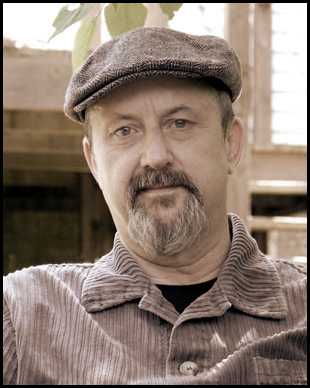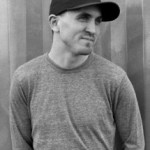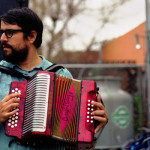A Conversation With Daniel Woodrell

Daniel Woodrell is the author of the new short-story collection The Outlaw Album. Like his other books, which include Winter’s Bone (recently adapted into an Oscar-nominated film), and The Death of Sweet Mister, The Outlaw Album deals with the residents of the Missouri Ozarks—an unforgiving landscape marred by poverty, crime and addiction, but also bolstered by the hardscrabble stoicism, loyalty to tradition, and unbreakable resolve of the people who live there. Woodrell was born and raised in the same place he writes about, and currently resides there. He’s been touring in support of his newest book, and he stopped by San Francisco’s Books Inc. in the Marina as part of Litquake, to read and meet fans.
There seems to be a lot of books that have come out recently that deal with themes you’ve been dealing with for years—rural poverty, local economies which revolve around meth production…
Yeah, it’s just a new reality. And there are a bunch of people doing rural America right now. Some of them have been doing it for quite a while—Ron Rasch, Pinky Benedict, Donald Ray Pollock—and there are quite a few newer writers that are covering similar a similar tone and demeanor and setting. I think there’s something in the air about the way the economy and everything has led to it.
Your stories generally have a crime element to them. Even ones that don’t immediately seem to end up with one. I’m thinking about the story “Black Step”—where a guy in the military decides to get married, and you eventually find out near the end that this woman might be banking on him dying, because she’s found out how much he’s worth if he’s killed in combat.
Yeah, and it’s also an homage, actually, to an old Irish story by John McGahern. Not a direct homage, but still an homage. I had been reading a thing about a woman whose military husband had died and it listed what the benefits were. I had no idea. It used to be just ten thousand dollars and you’re on your own, in my day, but now it’s a lot of money. And I said, there’s definitely a lot of people willing to connive for that kind of money. It’s in the hundreds of thousands actually, and that’s putting a lot of temptation out there for some people. So that story came about as I contemplated that. I already had the character, but I didn’t really know what the story would be until that came into it. And there’s been a lot of stories about combat stress recently—Ward 53, Walter Reed.
The term ‘country noir’ is generally mentioned in articles and reviews of you, but it’s also often discounted as not doing justice to your work. You seem to be on this level where you’re considered a ‘crime writer’ but your also considered a ‘literary writer.’ Do you ever make those distinctions or do they bug you?
Oh, it would be a nice thing if you could just be a writer, but I recognize that I am drawn to dramatic things, and generally for me that ends up involving some kind of criminal activity or criminal impulse or transgression that’s usually illegal.
For the ‘country noir’ thing, I don’t get upset at its use, but the term noir requires a rather strict definition to me. It applies to Death of Sweet Mister or Tomato Red, those are definitely noirs. Winter’s Bone, because it doesn’t have so tragic an ending, I probably wouldn’t call that a clear-cut noir. It’s an approximate description, rather than a precise description.
A lot of people would say that Winter’s Bone is essentially a private-eye novel.
I was thinking about it like an epic quest novel, writ small. But that’s what private eye fiction is anyway.
Yeah, she even gets beat up, like private eyes always do.
Yes, they do. (laughs)
Were you heavily influenced by any of those writers—Hammett and Chandler and such?
Oh, yes. Chandler, Hammett, Cain, all those guys. Hammett certainly—there was a period where I was all about Hammett. I’m now talking twenty years ago or more. And Chandler, I just love his company. He’s just such a clever bastard. I read a lot of him, and re-read a few of him. And James Cain, and Horace McCoy, all those Depression-era guys also influenced me.
You said that the Album in the title could refer to a music record. Your prose is very lyrical as well, so I was wondering if you took a lot of influence from music?
I definitely do listen to music. All kinds of folk and Americana. I don’t listen to any of it when I write, but I’m sure that’s influenced a little bit what my taste in a story is. I mean, Drive-By-Truckers, they’re good storytellers. Johnny Cash; the first album I bought in my life was Johnny Cash. All of that Americana ethos has seeped in.
You live in the area where you set a lot of your stories. Do people who live there read you, and has anyone ever gotten mad about something you wrote?
I haven’t had anybody get mad at me. Quite the opposite: I’ve had a number of people wanting to claim to be the model for especially Ree Dolly—there’s three of those at least. And the local antique mall has been selling my books and he’s hand sold over 500 of them in a town of 12,000 people. That’s pretty amazing to me. So I haven’t had any problem, and I generally feel they’re pretty protective of me. They’re glad that I’m there. I’ve had a number of people say, ‘Whether my kid reads or not, he’s turned on knowing there’s someone living up the hill here that’s actually written things that ended up becoming movies and influential books and all the rest.
You recently received the Clifton Fadiman award, presented to you by Dennis Lehane for your 2001 novel The Death of Sweet Mister. In your acceptance speech, you said that when you told your mother about it she said you were “in the high cotton now.” That seems a pretty apt description of the last two years, in regards to your career. Because of the award there’s a renewed interest in Death of Sweet Mister, and obviously the film Winter’s Bone was a big hit.
Huge. Let’s face it: the book had done well before the movie, but the movie made it do exponentially better. It’s sold, maybe not ten times what it had after the movie came out, but about eight times.
On top of that, Little Brown has also recently re-released your Bayou Trilogy, which received a lot of attention because it came out that President Obama read it.
Yeah. He picked it up anyway. He bought it, which is the most important thing.
It even caused some controversy, because some people were upset that he was reading novels, rather than books relating to policy.
Yeah, one of the conservative magazines had something to say about it.
Now, with your new book out, how have you taken all of this attention?
Well, I live kind of off the beaten path a little bit, so I hear about these things, but they don’t fully register until I get out and start traveling like this, get out in the rest of the world and see something has changed. [Winning] the Fadiman award was great, and came out of the blue really, so it’s gratifying. And Little Brown is behind me all the way. They’ve bought all my backlist, every book I’ve ever written will be out again by this time next year. You couldn’t ask for more than that.
What’s your writing process like?
I usually work in the morning, as close to getting up as I can. If I’m working well I work everyday. But I’m experienced enough now to know that sometimes you’re a little flat, and you’re better off going for a walk rather than sitting there grinding away. I do think it’s a good idea to try and write every day, but there are times when I realize its counterproductive.
You were in the MFA program at the Iowa Writers Workshop. What was your take-away from that, and do you encourage writers to go after an MFA?
You know, I’ve seen a lot of comments in the last few years attacking MFA’s. Well, they didn’t tell you to write a certain way. You may have got a sense that certain things were getting more praise from the faculty than others, but really there was a wider variety of writing than the idea of ‘MFA fiction’ would lead you to believe. And anyway, if you can be bent to the will of some teacher telling you you need to paint with pastels rather than primary colors, that’s on you. That’s not on the workshop, that’s on you for punking out. Unless that style of writing was natural to you and what you really wanted to do, then you made a mistake.
So I think it was, overall, good. It forced me to raise my game in a hurry. I was around a lot of people who really valued writing and knew about books and things I hadn’t encountered, so they turned me on to stuff that turned out to be very influential.
Flannery O’Conner studied at Iowa, and Barry Hannah was a teacher there. Reading this new book of your short stories, I was reminded of both of them. Were they an influence on your writing?
Flannery’s always been a huge influence of course. And I’ve loved Barry Hannah’s writing. I thought he was hilarious and his use of language, well, I don’t know anyone who quite did what Barry did. He was teaching there when I went, actually. I didn’t take a writing class from him, but I did take a forms class from him where we studied other books. Allegedly studied; we really just sat around talking about them. But his use of language and the gusto of his story telling… I kind of like his shorter fiction better. The other stuff has its brilliance as well, but I really did respond to the tighter, shorter crisp stuff, especially Airships. He was a really unique voice.
This is your first book of short stories. After writing novels for so long, what made you want to switch forms?
I was asked if I’d like to contribute a short story to an anthology, and there was a short story I’d been wanting to write, so it was a good excuse to write it. I didn’t have a novel going at the time, I was in between books, thinking about what the next one would be, so I wrote it. It ended up being “Uncle”, and I had a great time with it, and I continued with it. I said ‘I’m really getting something out of writing these short stories’ so I kept going with it, and over a period of years I came up with enough for a collection of them.
What’s the biggest challenge switching from writing novels to short stories?
Well, the ones I really like are usually pretty compressed and concise. You have to be able to strike very quickly in terms of establishing character and milieu and everything else. I suppose my novels attempt to do that as well, but you have a little bit more leisurely pace in terms writing a novel, even if it’s a tight novel.
I also liked the fact that I got to go in a variety of different directions in one book.
Do you plan to write more short stories or return to novels?
I’m in the middle of a novel that I’ve already sold to Little Brown and I’m approximately half-way. I’ve set it aside to tour and everything, but I’ll return to it as soon as I can and I hope to have it done by the middle of next year. There’s already been some discussion about bringing it out in the middle section of ’13.







